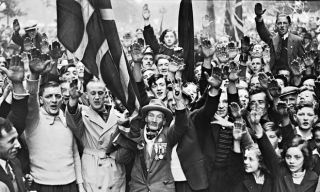Personality
Emotional Ideologies
Why Emotions and not Rationality govern our voting behavior
Posted May 8, 2015
One of my father's vivid memories of growing up as a Jewish child in Nazi Germany concerned the horrifying visit of his uncle Walter one evening in 1933. Pale as a ghost and shivering with fear, his uncle entered the house crying, “I’ve been bewitched!” When he calmed down he recounted that on his way home from the train station he came across a Nazi rally. At first he feared the mob but when he gained some confidence that his Aryan appearance would disguise his Jewish identity a strange feeling slowly took hold of him. When the rally sang the Nazi Party anthem, Walter joined in, mumbling the words to the song. Not long after that he suddenly noticed that he was actually getting swept up in the ecstatic crowd’s powerful emotions. Along with everyone around him, he was shouting “Sieg Heil.” Walter's emotional attraction to the fascist ideology of togetherness overshadowed rationality to the extent that he completely forgot that the ideology he so much wanted to be part of regarded him as one of its most hated enemies.
In recent years a growing body of evidence has shown that our political behavior is governed more by emotions and less by rationality. These findings contradict the way most of us think about political processes and voting. The theory of rational choice, influenced by great philosophers such as Thomas Hobbes and Emmanuel Kant, is considered to be the leading school of thought in political science since the second half of the twentieth century. But also outside academia political campaigners and the media primarily employ logical arguments, such as weighing candidates' pros and cons, and analyzing the implications of different policies. This is also precisely what most of us do when explaining the way we intend to vote, or when trying to sway someone else's opinion. James Carville's famous phrase from Bill Clinton's early ’90s campaign, "It's the economy, stupid!" reflects a broad conventional wisdom that voting is primarily about money. But no, voting is primarily about feelings and emotions! This is, to an extent, unfortunate because it means that we sacrifice some of our interests and welfare on the altar of our psychology.
The recent discoveries about the role of emotions in political behavior are linked to even more surprising findings that our political orientation is partially determined before we are even born by our genetic profile. Peter Hatemi and Rose McDermott assembled in 2011 a collection of works summarizing some of these studies. Let's first put things into proportion. There is no single gene whose one allele will make you support the left while its other allele will program you to be a right-wing person. It is also not the case that a decision to move from supporting the Tories in one election to supporting Labor in another requires a genetic mutation. But various combinations of different genes can create a behavioral disposition that – jointly with some social indicators – can help us predict one's political orientation. These findings together with many others explain why rationality plays an unimportant role in our political behavior. Logic and reasoning are universal. We all use the same logic (though some use it more than others), but moral sentiments and emotions are idiosyncratic. They are derived from our personality, which is what makes each of us different. People whose personality tends toward conformity and privacy are more likely to vote Conservative, while those who are drawn toward solidarity and empathy are likely to find Labor to be a more attractive party, and people who reject authority and favor freedom are likely to align themselves with Liberal causes. Conservative voters who wish to see the party pursue a more compassionate economic policy are potentially influenced by a different combination of traits. We can't accurately predict how a person will vote on the basis of his personality, but just as our personality affects how we dress and how we spend our vacation, it also influences how we vote. To some extent these three activities (and plenty more besides) serve us in communicating who we are and whom we like to associate with.
The decision to go out and vote, only for the sake of influencing the voting outcome, is in itself an irrational decision (political scientists refer to it as the "voting paradox"). Voting involves considerable effort, which needs to be offset by a considerable benefit if the decision is to be rational. But each of us separately has virtually zero influence on the election outcome. Through the entire history of democracy there has been no national election anywhere in the entire world that was determined by a single vote. Why do we nevertheless vote? The reason is that voting is an emotional and, to some extent, recreational activity. If voting was about influencing the election's outcome, you would have agreed with your next door neighbor who supports the rival party that you both stay home. But no. You want to be there to cast your vote, because voting is more about expression than about consequences. In a research paper that Esteban Klor and I published a few years ago, using data from U.S. state elections, we showed that patterns of state election turnouts are similar to patterns of football match turnouts. You will be more attracted to travel to the stadium and pay for a ticket if the two teams are close competitors and your team has a slightly higher chance of winning. After all, we expect to enjoy the game more when our team wins rather than loses.
Contrary to what most of us tend to believe, ideology is also mostly about emotions and hardly at all about rationality. Imagine a world in which ideology is ruled by rationality without any biases. In such a world there would be little room for political debate among intelligent people. If we were all exposed to the same facts we would end up reaching the same conclusions. We would still need parties and elections since our interests are not identical (for example, some people benefit from low taxes and others from high). But we would never remain split on questions such as which economic policy would benefit most of the Brits, or which policy would be most effective for tackling terrorism. The fact that we continue to debate these issues endlessly, and yet never seem to agree, suggests that there is something in ideologies way beyond rationality. This other thing is none other than subjective taste, which, to a large extent, is shaped by our emotional being. "De gustibus non est disputandum," as the Latin idiom goes ("In matters of taste, there can be no disputes"), and, indeed, disputes never help bridge opposing ideologies.
Here are two of many startling pieces of research evidence about the role of emotions in the shaping of our political orientation or moral sentiments:
1. Pazit Bloom of the Hebrew University conducted laboratory experiments showing that priming subjects with pictures of disgusting food items affects their political/moral view even when they are prompted to express their rational view on the issue. Subjects were asked about their opinion on gay couples' adoption. Those who were primed with disgusting pictures showed a more negative moral conviction even in questions that were supposed to evoke reasoning and cognition.
2. Political orientation is even influenced by unconscious emotions. Ran Hassin from Columbia University and the Hebrew University showed that subliminal priming can affect political orientation. US subjects who were exposed to a picture of the US flag on a screen for a fraction of a second were unable to notice the flag. Yet the opinions they expressed in a subsequent questionnaire were significantly more to the right of those who were not primed with the flag's picture.
In circumstances where reason is at odds with subjective taste, it is the latter that carries the day. In most cases we tend to pay attention selectively to the evidence that confirms our political orientation while pretending that the conflict between reason and taste does not exist. How many of our friends who regard themselves as right wing will admit that while they are disgusted by the idea of signing an agreement with fanatic ayatollahs, they logically realize that the West would be better off with the Iran agreement? How many of our left-wing friends will concede that while they are emotionally averse to any form of American intervention, the sanctions against Iran do seem to work and removing them now would be a dangerous move? Charles Taber and Milton Lodge of Stony Brook University used laboratory experiments to show that people's political reasoning is biased by their subjective moral sentiments. After subjects expressed their opinions on gun control and affirmative action, they were given a list of pro and con arguments used by professional lobbies that seek to affect policies on these issues. They were asked to rate the strength of each argument evenhandedly and based on pure reasoning. But these rating turned out to be highly biased. Arguments supporting one's own view were rated stronger.
To understand the extent to which ideology can distance us from common sense, consider the case of Trofim Lysenko, Stalin's famous agronomist who researched techniques for increasing crop yield. Lysenko was so enamored of socialist ideology that he managed to convince himself and the entire Soviet Union that wheat can be "educated" to yield more by forcing it to get used to harsh environmental conditions of temperature and humidity. In his "wheat gulags" he planted soaked seed directly into the snow expecting a tripled yield, which never materialized.
Our craving for ideology also means that we like our politicians to be ideologists. Vittorio Caprara and his associates showed that voters seek to vote for politicians who are similar to them in personality. Ideology is often the means by which politicians convey their personality to us. Politicians who downplay ideology are wrongly tagged by us as opportunists who are into politics for themselves and not for the public.
On top of the role that personality traits play in our ideologies and political behavior, group identity figures largely in the way we vote. Political orientation is very often transmitted from one generation to the next by means of education and socialization, and many feel a sense of betrayal when reasoning leads them to deviate from the traditional political behavior of their family members, friends, or ethnic group.
But our desire for ideologists comes with a price, because it creates the wrong incentives for our policy makers. Politicians are much more rational than we voters. They are governed primarily by their instinct for political survival. Our need for them to follow an ideology means that they will obey it to appease us. They even believe in their ideology to convince us that they will do so. But this is precisely against our interest as a public.

Sometimes such a smart decision is liberal; at other times, conservative. We don't need them to impose their subjective moral sentiments on us or to use policies as a means of emotional expression.
Born at the end of the nineteenth century with great promises for a better society, ideology at the end of the twentieth century has nothing to show for itself but hundreds of millions of dead, murdered by the three greatest ideologists of all time: Hitler, Stalin, and Mao. By understanding our craving for ideology there is a chance that one day we'll be able to dispense with it. When that happens we shall all be better off.
(The piece appeared in the Guardian on the day of the UK election)
Eyal Winter is a professor of economics at the University of Leicester and the Center for the Study of Rationality of the Hebrew University. He is the author of "Feeling Smart: Why our Emotions are More Rational Than We Think"




